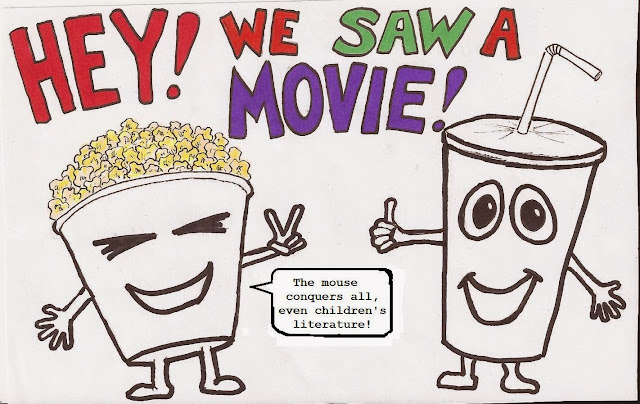Toaster’s Contribution: I really enjoyed this film. It was
delightful, well written, excellently acted and just plain entertaining. Emma
Thompson was wonderful as P.L. Travers, the author of the Mary Poppins books.
Thompson brought the perfect level of curmudgeon meets stuffy Brit and as such
brought a great deal of humor to the movie. Tom Hanks was great as Walt Disney;
he captured that eccentric, millionaire, perpetual big kid persona that Disney
was legendary for. In all, the film had an excellent cast including Paul Giamatti,
Bradley Whitford, BJ Novak, Jason Schwartzman and Colin Farrell.
Whitford, Novak and Schwartzman were really entertaining and
helped to carry the scenes of the Disney writers working with Travers, playing
befuddled straight-men to Thompson’s nit-picking. I actually didn’t realize
Schwartzman could sing and play piano. I knew he could play drums (for the band
Phantom Planet once upon a time) but he
is really showing how talented he is whether Wes Anderson is involved or not. I
also want to point out that Paul Giamatti is surprisingly versatile and
continues to prove himself one of the most underrated actors in Hollywood. In 12 Years a Slave he played a vile,
despicable slave trader that I just wanted to beat with a big stick. In Saving
Mr. Banks, he was just the nicest man that I would have wanted to hug. I might
add that he was equally convincing in both parts too. I’m glad he gets as much
work as he does.
I especially want to highlight the performance by Colin
Farrell. The man continues to surprise me in terms of his acting ability. He
portrayed Travers’ father, who died when she was only seven. The man was
troubled by his drinking problems, but was never depicted as abusive or mean.
Instead, right from the first scene of the film, he is shown as a loving father
who encourages the imagination of his daughter and that in turn reflects their
very relationship. His problems with alcohol were shown more in his inability
to hold down a job by letting drinking influence his behavior and having a
short temper. I personally found it refreshing to see the portrayal of the
alcoholic father not as an abusive cliché but through the symptomatic demons of
his behavior. It helped us to love her father in spite of his problems rather
than struggle to find redemptive value in a monster.
I realize that this film, as with any biographical movie,
was skewered by those who write it, omitted key details and ultimately condensed
large passages of time into a feature length block. Was the story skewed toward
the perspective of Disney being a hero of sorts? Yes, but that was bound to
happen as his corporate legacy produced the project. Had Travers left behind a
massive media conglomerate, I imagine her successors could have spun a tale of
an artist being manipulated and ultimately screwed over by big business. But
that’s not what Saving Mr. Banks was about. It was about making peace with your
past and finding loving redemption through art; factual or not the film produces
that redemptive value in both its interpretations of Disney and Travers, right
or wrong. I personally feel that, having virtually no knowledge of the true
life story behind the plot heading in, that the makers of the movie did an
excellent job telling a funny, engaging and well crafted story. I also forgot
how many catchy songs were in Disney’s Mary Poppins.
Jonny’s Contribution: Jonny Prophet refused to see this film
under protest that Walt Disney’s head wasn’t thawed and placed on a robot body so
he could play himself in the movie.
Coming soon... more movie reviews to keep hope alive in the midst of the long and terrible winter.


No comments:
Post a Comment